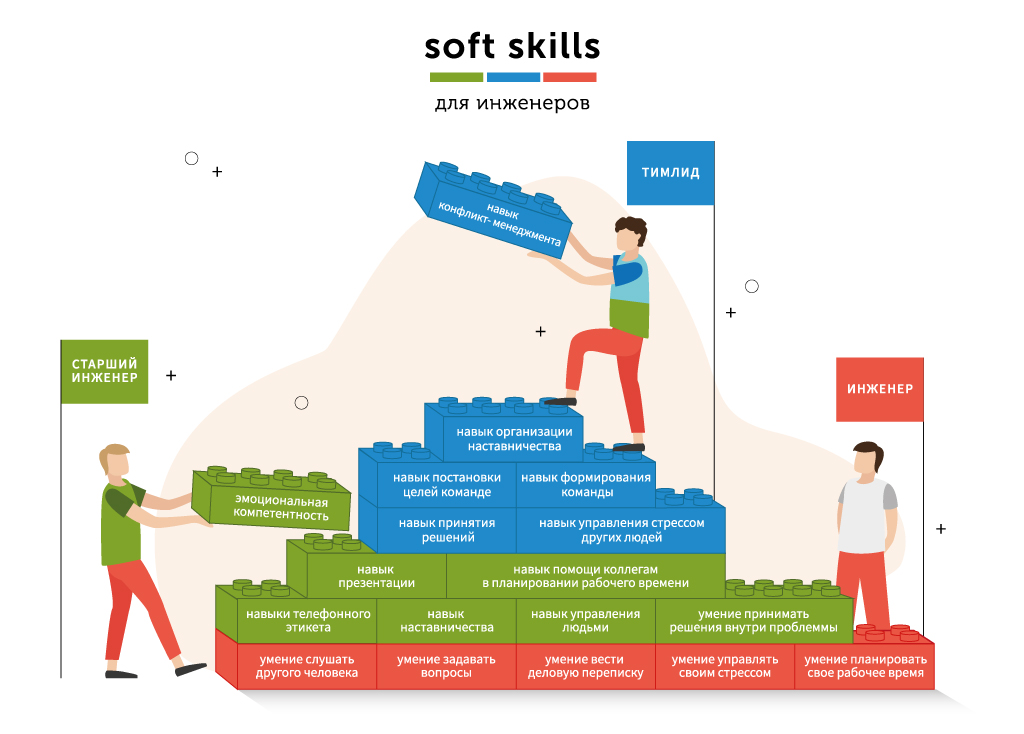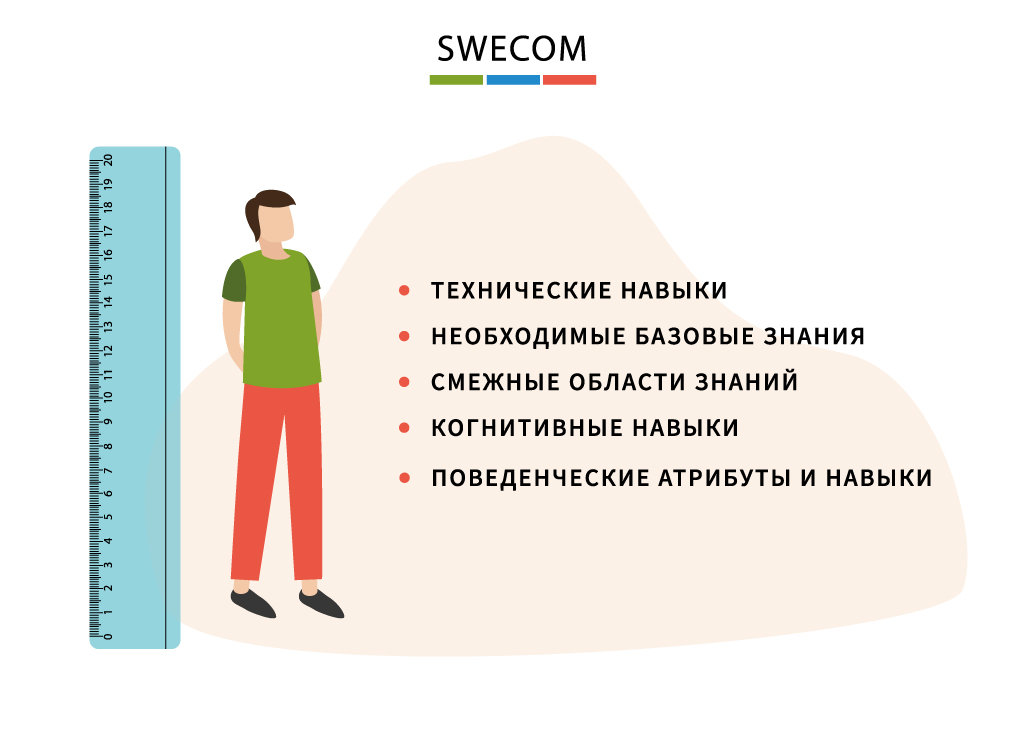Why should soft skills engineer
The skills that IT-specialists use in their work are divided into two types - hard skills and soft skills. The first are professional skills that engineers use when solving technical problems. This is, for example, possession of Java or knowledge of the Big Data stack.
What about the second? Soft skills are a complex of non-specialized skills that are equally important in work. What are these skills, why do they need an IT specialist, how to develop them, why engineers with advanced "flexible skills" are becoming increasingly popular, explains the team leader of one of the EPAM testers team and soft skills coach Sergey Atroshchenkov .

What is soft skills
Soft skills are non-professional skills that are not related to the official duties of a person. In the IT field, these are knowledge and skills that are not related to development or testing, but are necessary for successful teamwork.
Very often, between the concepts of "soft skills" and "sociability" equate. Like, if you know how to put words into complete sentences, it means that you are fine with soft skills. This is a very superficial presentation.
In my opinion, the concept of "flexible skills" includes two large sections - communication and goal setting.

Why are all these skills an ordinary engineer, whose main task is to write code or test applications? At least to communicate with other team members and do it effectively. Today, the vast majority of programs are created in teams. To make a successful and profitable product alone is almost impossible. Yes, you can invest your talent, time and energy, working without any help. But much more dividends will bring you work with like-minded people. Facebook, iPhone, Google are products of team work. The ACM / ICPC International Programming Contest is not held among individual developers, but among teams - I think it is not by chance.
It is very difficult to be a team player without interpersonal skills (ability to ask questions, listen and hear another, to express one's arguments with arguments). If you work in an international team, you also need to understand the principles of intercultural communication and business correspondence. Imagine you are writing a letter to a foreign colleague that you have found several bugs in his code. You indicate errors and ask to correct them as soon as possible. But for some reason, a foreign colleague reads the letter and begins to wonder. You seem to him rude and even a bit aggressive. And all because instead of “Could you please fix these bugs?” They wrote “Fix these bugs”. All this seemingly ostentatious politeness, “verbal fluff” is the norm for Western business correspondence. And these rules need to be known
And soft skills are needed by an engineer in order to properly plan their time , set effective goals, manage their emotions and consciously approach their work.
In addition, sooner or later you will want to grow: to get a promotion or salary. At least that's what happens with most engineers. And here you need to understand that with each new step in a career “flexible skills” are increasingly coming to the fore. In high positions (team leader, manager) you will not be able to do without leadership qualities, formed emotional intelligence, and conflict-management skills. Of course, these skills will not appear on your own, they need to begin to form in advance. To treat the development of soft skills should be no less responsible than to pumping their technical knowledge base.
Some IT companies have their own competency matrix. It reflects the required set of technical skills for specific positions and allows you to understand what position the employee corresponds to. The main drawback of the matrix of competencies is that it does not spell out what “flexible skills” a person should possess at a particular career level.
In my opinion, a basic set of soft skills should be indicated for each position. A specialist should understand that if he, for example, plans to become a senior engineer in two years, he needs to improve not only his technical base, but also the skill of presentation, effective communication with colleagues and customers.
I imagine the soft skill matrix as a pyramid. Its foundation is the basic skills that any engineer should possess. With the advancement of a specialist in the post, the pyramid of skills grows. The senior engineer should already possess not only the basic skills, but also the set of soft skills necessary for his position. The skill base for a team leader is the sum of the skills of an engineer and a senior engineer. On it, he builds on the skills of the team leader.

A few years ago, the IEEE Institute developed the SWECOM model .(Software Engineering Competency Model). The advantage of this model is that it describes not only hard skills for an engineer, but also gives much attention to soft skills: cognitive skills and behavioral attributes. SWECOM can be used as a basis if you have decided in your company to revise or develop your own competency matrix from scratch.

“Flexible skills,” as opposed to “hard skills,” are very difficult to measure. So far, there is no universal scale for assessing emotional intelligence or, say, a level of stress tolerance. How, then, to understand whether one or another soft skill is developed or not enough?
I propose a simple algorithm:
There is such a myth that if an engineer is an introvert , it means everything is bad with his soft skills. They say that introverts do not like other people, do not know how to express their thoughts and generally prefer to sit in a corner and silently write their code with a gloomy facial expression.
To people who really think so, I advise you to read Carl Jung and find out what he put into the concept of “introversion” . In short, an introvert is not a sociopath, but a person with a focus on the inner world. The fact that he does not get pleasure being in a crowd has nothing to do with soft skills.
It seems to me that some of the “flexible skills” of introverts are better developed than those of extroverts — empathy, the ability to hear the interlocutor, and business etiquette. A person who spends a lot of time analyzing the outside world understands how an inaccurate word or gesture can hurt another person.
In the 21st century, IT is becoming increasingly business-oriented.
Digital technologies have come to virtually all industries, leaving aside even the most traditional areas, such as trade or banks. Any business today needs to be present on the Internet - otherwise customers will go to more advanced competitors. For this, customers and turn to IT-companies . Those, for their part, help businesses achieve their goals by creating convenient applications for their clients.
In the past few years, the need for professions such as a business analyst in IT projects, delivery manager, product manager has arisen in the IT field. These people communicate with customers, monitor the market, analyze customer needs and manage project teams. In other words, all their work is based on soft skills.
Many IT companies today work on Agile, most of whose principles prioritize soft skills . Everything goes to the fact that already in 15-20 years “flexible skills” will overshadow the importance of “hard” ones: IT-specialists will completely switch to business processes, and machines will deal with technical tasks. Therefore, to be in demand in the future, you need to start developing soft skills now.
Trainings
• Stratoplan International Online School of Managers
• EQuator Training Company
Literature
What about the second? Soft skills are a complex of non-specialized skills that are equally important in work. What are these skills, why do they need an IT specialist, how to develop them, why engineers with advanced "flexible skills" are becoming increasingly popular, explains the team leader of one of the EPAM testers team and soft skills coach Sergey Atroshchenkov .

What is soft skills
Soft skills are non-professional skills that are not related to the official duties of a person. In the IT field, these are knowledge and skills that are not related to development or testing, but are necessary for successful teamwork.
Very often, between the concepts of "soft skills" and "sociability" equate. Like, if you know how to put words into complete sentences, it means that you are fine with soft skills. This is a very superficial presentation.
In my opinion, the concept of "flexible skills" includes two large sections - communication and goal setting.

What soft skills do engineers need
Why are all these skills an ordinary engineer, whose main task is to write code or test applications? At least to communicate with other team members and do it effectively. Today, the vast majority of programs are created in teams. To make a successful and profitable product alone is almost impossible. Yes, you can invest your talent, time and energy, working without any help. But much more dividends will bring you work with like-minded people. Facebook, iPhone, Google are products of team work. The ACM / ICPC International Programming Contest is not held among individual developers, but among teams - I think it is not by chance.
It is very difficult to be a team player without interpersonal skills (ability to ask questions, listen and hear another, to express one's arguments with arguments). If you work in an international team, you also need to understand the principles of intercultural communication and business correspondence. Imagine you are writing a letter to a foreign colleague that you have found several bugs in his code. You indicate errors and ask to correct them as soon as possible. But for some reason, a foreign colleague reads the letter and begins to wonder. You seem to him rude and even a bit aggressive. And all because instead of “Could you please fix these bugs?” They wrote “Fix these bugs”. All this seemingly ostentatious politeness, “verbal fluff” is the norm for Western business correspondence. And these rules need to be known
And soft skills are needed by an engineer in order to properly plan their time , set effective goals, manage their emotions and consciously approach their work.
In addition, sooner or later you will want to grow: to get a promotion or salary. At least that's what happens with most engineers. And here you need to understand that with each new step in a career “flexible skills” are increasingly coming to the fore. In high positions (team leader, manager) you will not be able to do without leadership qualities, formed emotional intelligence, and conflict-management skills. Of course, these skills will not appear on your own, they need to begin to form in advance. To treat the development of soft skills should be no less responsible than to pumping their technical knowledge base.
What soft skills do engineers need?
Some IT companies have their own competency matrix. It reflects the required set of technical skills for specific positions and allows you to understand what position the employee corresponds to. The main drawback of the matrix of competencies is that it does not spell out what “flexible skills” a person should possess at a particular career level.
In my opinion, a basic set of soft skills should be indicated for each position. A specialist should understand that if he, for example, plans to become a senior engineer in two years, he needs to improve not only his technical base, but also the skill of presentation, effective communication with colleagues and customers.
I imagine the soft skill matrix as a pyramid. Its foundation is the basic skills that any engineer should possess. With the advancement of a specialist in the post, the pyramid of skills grows. The senior engineer should already possess not only the basic skills, but also the set of soft skills necessary for his position. The skill base for a team leader is the sum of the skills of an engineer and a senior engineer. On it, he builds on the skills of the team leader.

A few years ago, the IEEE Institute developed the SWECOM model .(Software Engineering Competency Model). The advantage of this model is that it describes not only hard skills for an engineer, but also gives much attention to soft skills: cognitive skills and behavioral attributes. SWECOM can be used as a basis if you have decided in your company to revise or develop your own competency matrix from scratch.

How to measure your soft skills
“Flexible skills,” as opposed to “hard skills,” are very difficult to measure. So far, there is no universal scale for assessing emotional intelligence or, say, a level of stress tolerance. How, then, to understand whether one or another soft skill is developed or not enough?
I propose a simple algorithm:
- Request feedback from colleagues, your manager, customer. Listen carefully or read it, not arguing and not making excuses.
- Identify the problem. Suppose a few people in your feedback indicate that you have difficulty communicating. Agree, it sounds pretty general, you need to dig deeper. Find out what exactly this is manifested in - that you often interrupt the interlocutor, or that you cannot argue your point of view in a reasoned way?
- Understand for what purpose you need to develop the "problem" skill. Suppose your problem is that you do not always clearly express your thoughts. As a result, there is often a misunderstanding between you and your colleagues, which slows down the teamwork process. This can lead to a breakdown of the deadlines, a conflict with the customer or the management of the company, loss of profits. The goal is clear: the skill needs to be developed in order not to let down your team or company.
- Act! Start developing a “problem skill”: read thematic articles, books, find a mentor, contact your trainers. Do not forget about the classical “knowledge - skill - skill” pattern and practice as often as possible.
Soft skills and introversion
There is such a myth that if an engineer is an introvert , it means everything is bad with his soft skills. They say that introverts do not like other people, do not know how to express their thoughts and generally prefer to sit in a corner and silently write their code with a gloomy facial expression.
To people who really think so, I advise you to read Carl Jung and find out what he put into the concept of “introversion” . In short, an introvert is not a sociopath, but a person with a focus on the inner world. The fact that he does not get pleasure being in a crowd has nothing to do with soft skills.
It seems to me that some of the “flexible skills” of introverts are better developed than those of extroverts — empathy, the ability to hear the interlocutor, and business etiquette. A person who spends a lot of time analyzing the outside world understands how an inaccurate word or gesture can hurt another person.
Soft skills and business
In the 21st century, IT is becoming increasingly business-oriented.
Digital technologies have come to virtually all industries, leaving aside even the most traditional areas, such as trade or banks. Any business today needs to be present on the Internet - otherwise customers will go to more advanced competitors. For this, customers and turn to IT-companies . Those, for their part, help businesses achieve their goals by creating convenient applications for their clients.
In the past few years, the need for professions such as a business analyst in IT projects, delivery manager, product manager has arisen in the IT field. These people communicate with customers, monitor the market, analyze customer needs and manage project teams. In other words, all their work is based on soft skills.
Many IT companies today work on Agile, most of whose principles prioritize soft skills . Everything goes to the fact that already in 15-20 years “flexible skills” will overshadow the importance of “hard” ones: IT-specialists will completely switch to business processes, and machines will deal with technical tasks. Therefore, to be in demand in the future, you need to start developing soft skills now.
Materials on the topic
Trainings
• Stratoplan International Online School of Managers
• EQuator Training Company
Literature
- Brian Tracy "Delegation and Management"
- Jim Collins "From Good to Great"
- David Caruso “Emotional Intelligence of a Manager: How to Develop and Apply”
- David Logan "The Leader and the Tribe"
- Daniel Pink "Drive. What really motivates us "
- Larry King "How to talk to anyone, anytime, anywhere"
- Maxim Batyrev "45 manager tattoos"
- Mikhail Litvak "Psychological Aikido", "Command or obey? Psychology of management"
- Patrick Lensioni “Five vices of the team”, “Why not everyone likes to go” to work. The truth about the involvement of employees "," Death from meetings "
- Sergey Shabanov, Alena Aleshina “Emotional Intelligence. Russian practice "
- Timothy Lister, Tom DeMarco “The human factor. Successful projects and teams »
- Tom DeMarco "Deadline. A novel about project management
- Frederick Lalu "Discovering the Future Organizations"
- Eric Bern “Games that people play. Psychology of human relationships "
